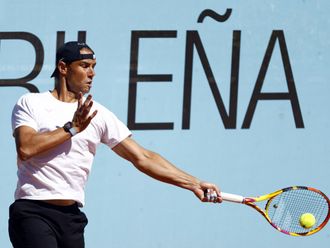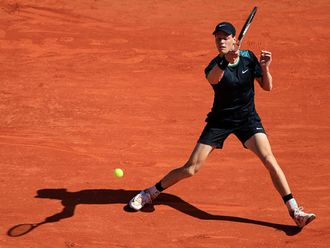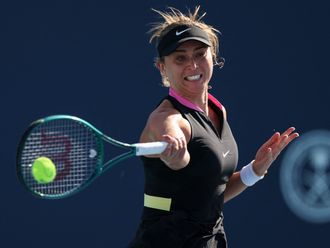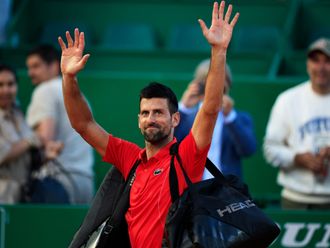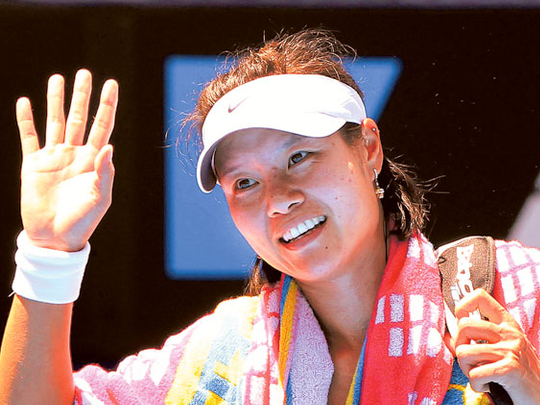
Beijing: A typical “neighbourhood kid” toting a badminton racket in the Yangtze river port of Wuhan, eight-year-old Li Na could have had little idea the path the Chinese state set for her might lead to tennis glory, riches and Asia’s first Grand slam singles title.
Steered into a sports college to work on her badminton, Li was soon diverted into a tennis programme after coaches found her stroke-making too lusty for the gentile sport played on street-sides across the country.
The fiery swing was to eventually become her hallmark, the crunching shots laced from the baseline propelling her to two grand slam titles, all in defiance of a litany of injuries that threatened to bring a premature end to a trailblazing career.
Li lost the battle with her body this year, persistent surgeries on her knees blamed principally for ending the career of Asia’s most decorated player on Friday.
“When I started playing tennis, I was just a neighbourhood kid with an after school hobby, not realising what magical journey lay ahead of me,” she said in her farewell statement.
“If I only knew what a vehicle the sport of tennis, along with my success, would become for my beloved China.” Her loss will be felt keenly at home.
One of her China’s “Golden Flowers”, the clutch of top women players to emerge a decade ago, Li staked her nation’s red flag on centre courts the world over.
Injuries and a combustible temperament would haunt her throughout, but Li would emerge the strongest of the pack, etching her name in the clay at Roland Garros in 2011.
There, she upset defending champion Francesca Schiavone in the final at the age of 29 and in front of a then-record television audience back home.
Her battles to cast off the guiding hand of the state — a Soviet-style sports regime that nurtured her career while pocketing most of her winnings — became an irresistible emblem of China’s social and economic transformation.
But that was only half the story for Li, who never saw the rose tattoo on her chest as a symbol of rebellion.
In interviews she described herself as conservative, a traditional woman who wanted nothing after her tennis career but to take care of her husband and hitting partner Jiang, an on-again off-again coach and a hapless target for her on-court frustrations.
In public, however, she seemed anything but buttoned up, as she joked about shopping sprees and how Jiang’s snoring would keep her awake before important matches.
In the age of social media, her hilarious victory speech at this year’s Australian Open went viral after she thanked Jiang for “fixing the drinks” and her powerful IMG agent Max Eisenbud for “making (her) rich”.
Household name
As a young girl making the switch from tennis to badminton, Li had to explain to her mother what tennis was, but mainland China now boasts eight WTA events, one in her hometown of Wuhan.
“It’s hard to be a household name in a nation with 1.4 billion people, but that’s what Li is,” WTA boss Stacey Allaster said upon her retirement.
Though hand-picked by the state and tapped for national duty, Li gave it all away in her early 20s to study media at university, just as her career threatened to bloom.
She returned to the tour in 2004 and immediately put China on the map, becoming her country’s first WTA event winner in her home tournament of Guangzhou.
Rumours of clashes with China’s sports mandarins became rife, and the leader of the country’s tennis association Sun Jinfang publicly berated her during her dips in form throughout her career.
Li, however, was magnanimous in victory, thanking Sun and the establishment repeatedly for a landmark decision after the 2008 Beijing Games that allowed her and a handful of her elite colleagues to “fly solo” and organise their own careers.
Free to pick her own coaches, set her own itinerary and keep most of her winnings, Li prospered, reaching the semi-finals of the 2010 Australian Open and becoming the first Chinese to break into the singles top 10.
She always described Melbourne Park as her “special place”, thriving in Rod Laver Arena’s “qi”, but tasted heartbreak there the following year, overhauled by champion Kim Clijsters in the final and teeing off at rowdy Chinese fans in the terraces.
The disappointment steeled her for her breakthrough at Roland Garros four months later, but it was to be another three years before she would savour her second grand slam title.
She wept bitter tears at Melbourne Park after being dumped from the fourth round by Clijsters in 2012.
She rolled an ankle and banged her head on the Melbourne hard-courts in a drama-filled final against Victoria Azarenka at the Australian Open last year.
Little wonder, thrashing Dominika Cibulkova to win at Melbourne Park in January felt like payback from the gods for Li.
After all, she had all but hung up her racket in disillusionment before the previous Wimbledon in the midst of a lean patch and scathing critiques from Chinese media.
“I wasn’t supposed to be here in the first place, remember?” she wrote in her farewell speech.
“Not many people believed in my talent and my abilities, yet I found a way to persevere, to prove them [and sometimes myself] wrong.”


